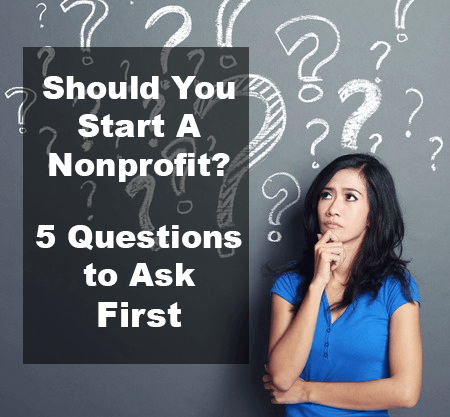It is relatively easy to file the paperwork to start a nonprofit organization. The question is if you should start a new nonprofit. Being a charity is much more than filing a form. Successful nonprofit founders invest years of their lives, almost always as volunteers, to put together their organizations.
It takes time, money, resources, and a dedicated team to make it work. So before you put all that energy into your cause, ask these five questions! You might be able to meet your goals a better way. (Also read: Should Your PTO File For Nonprofit Status?)
1. Is another organization already doing the work you want to do?
Before you even consider starting a nonprofit and filing the paperwork to be a new 501c3 charity registered with the IRS, research! Research is much more than a simple search bar inquiry. For example, maybe you are a nurse that is troubled by the growing number of children you treat for diabetes. You wonder, why is nobody helping these children and their families with nutritional education, athletics programs, or other services to curb this disturbing trend?
You plug “children diabetes our town” in your search engine and come up with nothing. Your idea is to put together a support services and after school club to which you can refer patients. Really though, you should expand your research first in the following ways:
- Research national or regional organizations helping your cause. Maybe no one is applying diabetes support directly to your community, but surely a national organization is within your service area. For example, the American Diabetes Association has multiple ways to apply diabetes awareness in your community. You can even register directly with them as a volunteer and start a new chapter or program in your area! Why create a local organization when a national one has all of the resources and established fundraising network to help you accomplish your goals?
- Research organizations that could be helping as part of their mission. Even if you do not have a dedicated charity particularly for youth with diabetes in your town, you most likely have youth organizations that are aware of the problem and have programs established to help. Make a list of all the youth agencies you know of in your community and check their websites, go to their offices, or send some email inquiries asking what they are doing about diabetes. You might find that they already have a service. Do the same for hospital networks, schools, and other related industries.
2. Is there another organization that could be doing the work you want to do?
If those agencies you identified in your research are not exactly fulfilling your goal, reach out and ask if they would like to. It makes little sense to create an entire organization from scratch if you can partner with one that already has resources and a community presence. Offer to fundraise for your own project, to create an advisory board, and to attract volunteers.
3. Are you an organization or a project?
A trend in general in fundraising is project funding as opposed to ongoing general support for nonprofit organizations. Funders like projects that have a beginning and end date, a dedicated purpose, and pool resources.
You work might be more suited for fiscal sponsorship than for nonprofit 501c3 status with the IRS. In short, you can apply for another organization to be your sponsor to handle all your finances and administration under their umbrella. They usually take a portion of your fundraising, though multiple arrangements are now available.
The National Network of Fiscal Sponsors has a directory to help you find a sponsor that suits your project mission.
Also read: Steps To Starting A Successful Nonprofit
4. Are other people behind you?
It takes more than you to start a nonprofit and make it work. At minimum, you need a board of directors. Dozens of volunteers lined up will make you even more successful. You cannot do it alone. Even if you have identified a true need in your community that no other organization can help solve, you probably do not want to start an organization if you do not have people behind your cause.
5. Are you going to be able to fund your organization?
Fundraising is tough. It takes time and dedication even if you have the required skill set to do it. So do not just ask if you can get a grant or a donation in the short term to start working, but ask if you are going to be able to fund the organization in the future. Before you even apply for 501c3 status, you should develop a revenue plan. How much money will you need to reach your goals for three years? And how are you going to get it? You might be better suited as either a short term project with a fiscal sponsor or as a social enterprise other than as a nonprofit.
In the end, if you think through all these questions and still want to be a nonprofit, great! That means you have a real innovative solution to meeting a community need that nobody else is addressing or can. It also means you have a team of dedicated people willing to support you. And it means that you will be able to fundraise and sustain your organization not just now but into the future.
The IRS has a whole site dedicated to nonprofits to guide you to fill out your forms. Good luck!

